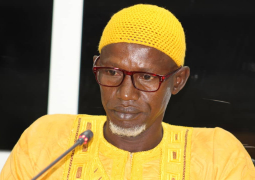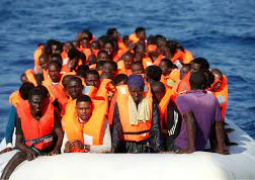
This 80th anniversary, according to officials, is pivotal in view of the institution’s stance and humanitarian resolve to forge peace, advance justice, and promote dignity for all peoples.
"For eight decades, the United Nations has stood as the best proof of multilateralism, bringing nations together across continents and cultures to confront our shared challenges and pursue our common aspirations,” the vice president remarked. “Today, as we reflect on this remarkable journey, The Gambia reaffirms its commitment to the principles enshrined in the UN Charter and to the UN80 vision of ‘Building Our Future Together’."
The vice president dilated on the relationship between The Gambia and the United Nations, describing it as one of enduring partnership and deep mutual respect.
Since joining the UN family in 1965, he recalled, The Gambia has benefited immensely from the organization's support across every facet of the country’s development journey.
"From strengthening democracy, good governance, democratic institutions and promoting human rights to advancing healthcare, education, agriculture, food systems, social protection, clean energy, action against climate change, digital transition, and food security, the UN has been one of our strongest partners in our nation's progress and towards sustainable development," he said.
He equally acknowledged UN's continued presence on the ground through its various agencies, funds, and programmes.
The UN family, he added, has consistently demonstrated that global solidarity can yield tangible results in the lives of ordinary Gambians.
The Vice President also spoke about the work of the UN, which he said, cuts across sectors: "From UNDP's support for governance reforms and institutional strengthening, to UNICEF's investment in our children's health, education, and protection; from WHO's partnership in building resilient health systems, to WFP's efforts to combat food insecurity and malnutrition; from FAO's work in strengthening agriculture and enhancing food systems, to UNFPA's vital contributions to reproductive health, family planning, women’s rights and youth empowerment; from UNAIDS' support in our fight against HIV/AIDS and health equity, to ITC's provision of skills development and livelihood opportunities for our young people, from UN Habitat support for sustainable urbanization, UN Women works on gender equality and empowerment, to the World Bank’s financial support, policy advice and technical assistance, to the work done by the IMF toward macroeconomic and financial stability, to IFAD’s work (agricultural and rural), to the work of UNESCO on biodiversity, OHCHR’s work on human rights, each UN entity plays a crucial role in advancing our national development agenda."
As the world marks this milestone, VP Jallow emphasised the need for people to acknowledge both “our achievements and the urgent work that remains”.
The 2030 Agenda for Sustainable Development and the 2063 African Union, he went on, represents “our shared blueprint for prosperity, peace, and planetary health”.
"Yet, we find ourselves at a critical moment,” he said. “The impacts of climate change, the lingering effects of recent global dynamics, rising debt burdens, and geopolitical tensions threaten to reverse hard-won gains, particularly for developing states like The Gambia."
Also speaking, Karl Frederick Paul, UN Resident Coordinator in The Gambia, recalled that 80 years in a world devastated by war, nations came with courage and with conviction to lay the foundation of a global architecture for peace and the protection of human dignity.
“In The Gambia, we celebrate that same spirit of unity, of partnership and of faith in what we can achieve together,” he stated.
He, however, reminded that the world now faces new challenges, citing geopolitical tensions; the triple environmental emergency; economic and social inequalities and the urgent need to transform nations’ development to make them sustainable and inclusive.
The UN resident coordinator maintained that today they also celebrate the story of The Gambia; since 1965, a nation that has placed development, peace, multilateralism at the heart of its work and of its diplomacy.
To that end, he extended deepest appreciation of government’s commitment to the UN Charter and to sustainable development.
The Gambia’s remarkable progress in development, governance, democracy, peace and stability, he said, is a powerful reminder that nations can rise from adversity through leadership, partnership and vision.
"The country is moving forward with determination, undertaking bold reforms to diversify its economy, advance the energy transition, strengthen food security and social protection and invest fully in its youth and women."
Across the globe, the UN Resident Coordinator acknowledged that Gambian peacekeepers wear the blue helmet with pride, saying they stand in some of the most fragile places on earth, protecting, building trust and carrying the hope of humanity.
The event, which was characterised with entertainment and short video presentations on the work of UN, also witnessed a presentation of a portrait depicting the country’s first leader, flanked by former officials of the UN.




